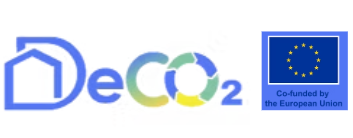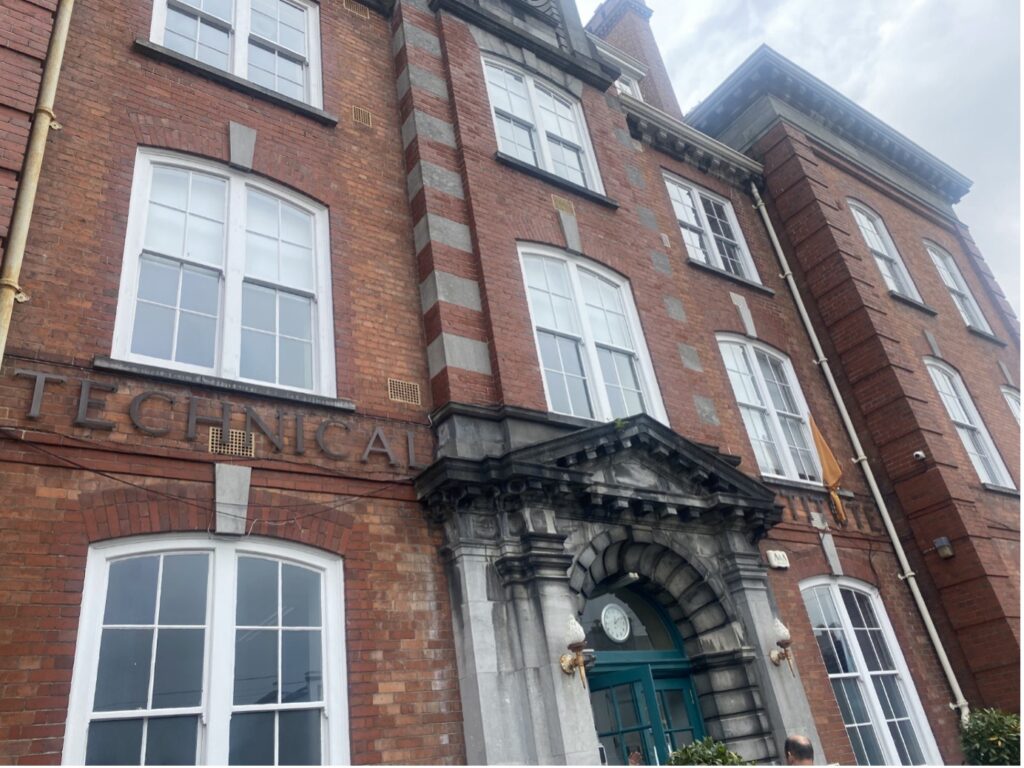
Project Reference Number: 101147781
Duration: 48 months
Project Start Date: 01 June 2024
Project Finish Date: 31 May 2028
TUS Project Budget € 345 000.00
Total Project Budget € 5 997 764.63
Project Summary:
The building sector holds a prominent position in energy consumption (40%) and CO2 emissions (36%) within the European Union. Moreover, current construction and renovation practices are huge raw material consumers and highly waste producers. Despite the efforts, on an EU scale, renovation rates are far below the minimum required, now only reaching around 1% of the building stock per year. These drawbacks bring forward the impact of rising material extraction, shrunk global circularity from to 7.2% in 2023. To facilitate closing this performance and design-to-market gap in the built environment, DeCO2 aims to address the compelling need for advancing innovative technological applications and solutions on the built environment, focusing on building elements, materials, products, and technologies. The project also aims to set up solid and long-lasting partnerships within the legal and regulatory framework and other stakeholders addressing the whole value chain for socio-economic innovation, facilitating to close the performance and design-to-market gap, including for historical and cultural heritage buildings. A well-segmented audience targeting developers, policymakers, and the construction industry will ensure effective market penetration, as DeCO2 is projected as an aligned solution to the EU’s sustainability aspirations. Collaborative engagement, showcasing tangible benefits and dedicated digital presence will embrace the entire building-life cycle and all the relevant stakeholders involved in each innovation action stage of renovation projects, materials, and techniques (targeting TRL 8) that contribute to space users’ overall health and wellbeing, comfort and inclusivity.
Project Aim(s) & Objective(s)
Project Aim: DeCO2 aims to address the compelling need for advancing innovative technological applications and solutions on the built environment, focusing on building elements, materials, products, and technologies. The project also aims to set up solid and long-lasting partnerships within the legal and regulatory framework and other stakeholders addressing the whole value chain for socio-economic innovation, facilitating to close the performance and design-to-market gap, including for historical and cultural heritage buildings.
Objectives per Work Package:
WP1: The main objective of WP1 is to coordinate and manage the project across its lifecycle. Specifically, the objectives are to manage the project across and budget agreements as set in the Grant Agreement and in accordance with EC guidelines and requirements; Carry out effective management, including management of collected sensitive data (adherence with GDPR), and close monitoring of all activities within the project’s framework; Facilitate cooperation between consortium participants; Monitor and adjust the scientific and technical implementation plan; Establish an internal system for communication and a platform for the exchange of data and IPR management plan; Ensure the creation of a robust system and safeguard the work of the project and its generated outcomes.
WP2: (a) Identify stakeholder requirements, engage relevant actors, and assess their needs to guide project activities. (b) Address inclusivity, comfort, health aspects, and accessibility in sustainable renovation practices. The latter integrates DeCO2’s approach to measure meaningful impact on people, the environment, and climate neutrality in EU societies and economies, supported by user-cycle and LCA studies.
WP3: (a) Define the technical requirements for the integration of DeCO2 components; (b) finetune and adapt the DeCO2 digital tools on local and regional material flows; (c) establish circular workflows for AEC professionals; (d) digitalise the circular decarbonisation renovation process through digital twins (e) provide a customized integrated dynamic decarbonization framework for renovation, that pursues more local/nearby production. Integrate the DeCO2 digital and physical systems into a dynamic renovation framework.
WP4: (a) Implement and evaluate fast-tracking sustainable renovation solutions in deconstruction, re-use, construction demonstrators to showcase decarbonisation pathways through re-designing of products, services; (b) Evaluation and Replication Strategies (post-occupancy, LCA, upscaling).
WP5: WP5 complements WP2 and WP4 and aims at understanding what conditions are needed to expedite the desired transition of innovative ideas from research (TRL 6-8) to market. The consortium will utilise regulatory sandboxes, collaborate with SSH, standardisation and certification experts to identify barriers and enabling conditions within controlled testing environments for innovation pathways. Research includes customer needs analysis, refinement of value propositions, and alignment of solutions with market demand, whilst ensuring ethical and human considerations are central to sustainable solution development, based on WP2 to 4. A pivotal focus of this WP is to streamline the validation process for requisite qualities, leading to expedited approval procedure (UGR-L).
WP6: (a) Develop a Communication Dissemination and Exploitation Plan for an effective communication and dissemination strategy to ensure large uptake and coverage of the project achievements and effective utilisation of the project results. (b) Enhance knowledge on project outcomes by sharing and re-shaping results from WP2-WP5. (c) Share best practices and lessons-learnt (in several languages) in an easy-to-understand format (infographics, policy and summary briefings, etc.) with support from the WPs leaders; (d) Create synergies with other projects and initiatives; (e) Contribute, upon invitation by the CINEA, to common information and dissemination activities to increase the visibility and synergies between Horizon Europe supported actions.
Project Outputs:
The demo site in Limerick (owned and run by partner Limerick Clare Education and Training Board) will test bio-based materials, using Mycelium and breathable adhesives to sequester carbon, as well as green roof testing with different waste products and green vegetation. Balancing cost, mechanical properties, and sustainability will be crucial in ensuring the success of the decarbonised retrofit. Bio-based fully recyclable composites and products in the form of Sandwich Insulation Panels developed by TUS will speed up the retrofit modular processes in a circular and cost-effective way for scalability for the construction industry. TUS with the support of partner Fraunhofer Gesellschaft zur Förderung der Angewandten Forschung EV will establish practical retrofitting and circular guidelines for the construction industry and building owners to support the DeCO2 uptake of circularity exchange and use of materials. The Retrofit Guidelines will include approaches to audit the condition and performance of the buildings, decarbonisation approaches and address considerations such as implementing bio-based materials and carbon sequestration methods as well as strategically integrating renewable services (ventilation, heat pump and PV) to ensure healthy buildings, circularity and ease of dismantling in the future. The actions implemented will be recorded in a digital twin to establish a building passport for the future maintenance and operations and training purposes for the campus, will be done by CEMOSA.
- Reduced energy consumption and emission through the innovative technologies, sustainable materials, and data-driven approaches, reduced resource depletion through the adoption of circular economy principles, advanced technology readiness levels in the built environment.
- Decarbonisation pathways framework, circular material platform, C-toolbox, digital twins for decision-making, advanced building scanning and robotic fabrication
- Digital tools and materials, data-driven processes, interoperability solutions
- Circular renovation solutions, cultural heritage preservation, affordability and inclusivity strategies
Project Partners:
1. Institute for European Energy and Climate Policy Stichting (lead)
2. PricewaterhouseCoopers Business Solutions
3. Centro de Estudios de Materiales y Control de Obra
4. Universidade Nova de Lisboa
5. Fraunhofer Gesellschaft zur Förderung der Angewandten Forschung EV
6. Lenze-Luigi 3-L-Plan GBR
7. WSolve B.V.
8. Universitaet Graz
9. Interessensgemeinschaft Terrassenhaus St. Peter
10. Instituto Valenciano de la Edificación Fundación
11. Institut d’Arquitectura Avançada de Catalunya
12. Instituto Tecnológico Metalmecánico, Mueble, Madera, Embalaje y Afines-Aidimme
13. CoCircular Sustainable Solutions SL
14. Ayuntamiento de Castellón de la Plana
15. WASP SRL
16. Technological University of the Shannon: Midlands Midwest
17. Limerick and Clare Education and Training Board

Iconic Education and Training Board Building in Limerick: the test bed for DECO2 in Ireland
Main Project Contact(s)
Name: Gloria Callinan
Email: gloria.callinan@tus.ie
Further Information
Project WebsiteProject Factsheet
Limerick ETB LinkedIn




